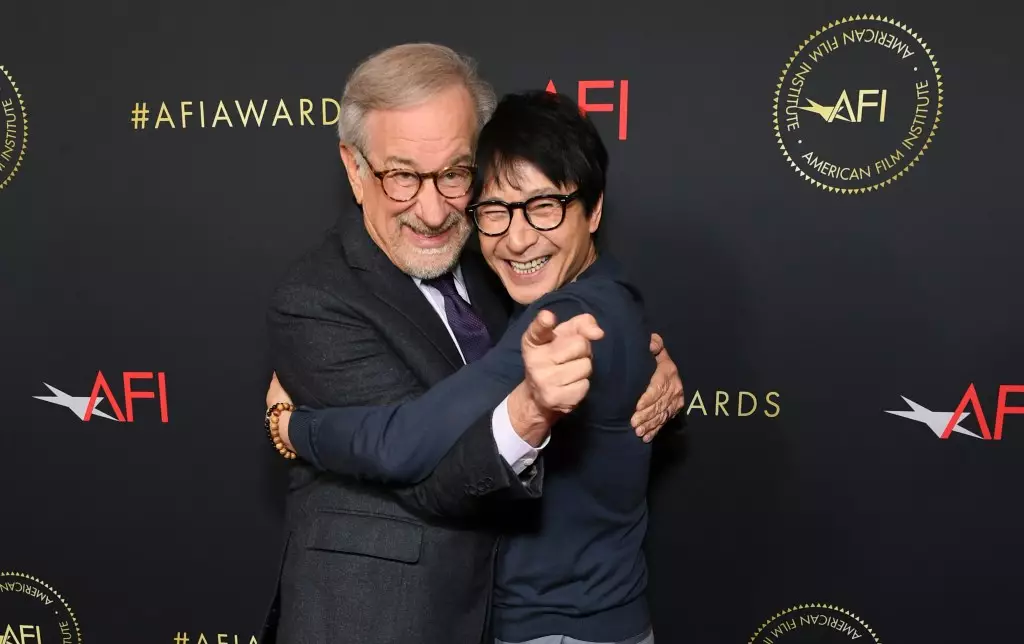Ke Huy Quan’s journey reflects not just an individual’s evolution but also a significant shift in Hollywood’s understanding of representation and the multifaceted nature of action heroes. The Oscar-winning actor has long been recognized for his roles in films such as “Everything Everywhere All At Once,” but now he is stepping into the action genre in a new and meaningful way that defies conventional expectations.
For years, Quan held onto a dream of becoming an action star, a fantasy that felt increasingly out of reach as he faced internal and external barriers. He candidly recognized that he did not fit the traditional mold of an action hero, often characterized by muscular physiques and a particular appearance, exemplified by icons like Dwayne “The Rock” Johnson and Arnold Schwarzenegger. This self-doubt initially kept him from engaging with the project “Love Hurts,” directed by the renowned Jonathan Eusebio, a transition that he later credited to a transformative conversation with filmmaker Steven Spielberg. It is significant that Spielberg encouraged Quan to take the leap, which speaks both to the mentorship present in Hollywood and to the importance of advocates who challenge outdated norms.
The reluctance that Quan felt about his role is emblematic of a broader struggle that many actors face, particularly those from marginalized communities. The industry has long perpetuated narrow definitions of what an action star ought to look like, often sidelining talent that doesn’t conform to these stereotypes. Quan’s story highlights a slow but promising evolution within the industry toward inclusivity.
When Quan finally accepted the role, he began to perceive it as an opportunity to redefine what it means to be an action hero. His realization that the film’s creators were aiming for a fresh interpretation of the genre is indicative of an industry in transition—a commitment to providing diverse narratives where actors of all backgrounds can thrive in traditionally exclusive spaces. There’s a sense that “Love Hurts” is not only a project for Quan; it is a canvas where he as an artist can paint a new identity for action protagonists.
Furthermore, Quan’s preparation for the role exemplifies an unwavering dedication to authenticity. His commitment to performing his own stunts required him to undergo rigorous training and pushed his physical limits, underscoring an admirable work ethic that resonates with many aspiring actors. The physical toll of such demanding roles could easily intimidate many seasoned performers, signaling the depth of Quan’s passion for embracing this challenge. His vulnerable moment of admitting to his wife that he might not be able to sustain this level of intensity speaks to the reality of high-stakes performances: the line between inspiration and exhaustion is precariously thin.
Looking forward, Quan’s career continues to gain momentum. Following “Love Hurts,” he is set to appear in “The Electric State” and lead the action thriller “Fairytale in New York” for Lionsgate. These upcoming projects not only sequence him into a range of roles but also position him as a trailblazer for Asian representation in action films, marking a radical departure from the roles traditionally assigned to actors of his background.
As audiences begin to embrace the idea that action heroes need not fit a singular mold, Quan stands at the forefront of a progressive shift within Hollywood. His experiences serve as potent reminders of the potential for change championed through the arts. By accepting and excelling in roles that others might overlook, Quan isn’t just carving a niche for himself; he’s paving the way for future generations of diverse actors. His undeniable talent and determination showcase that dreams can manifest into reality, inviting us to reconsider our preconceived notions of what makes a hero.
Ke Huy Quan is not merely stepping into action roles; he is engaging in a redefinition of identity and representation, generating excitement for what the future may hold. The evolution of his career mirrors the evolution of the industry itself, suggesting that a new paradigm where diverse voices lead in action might finally be here.
